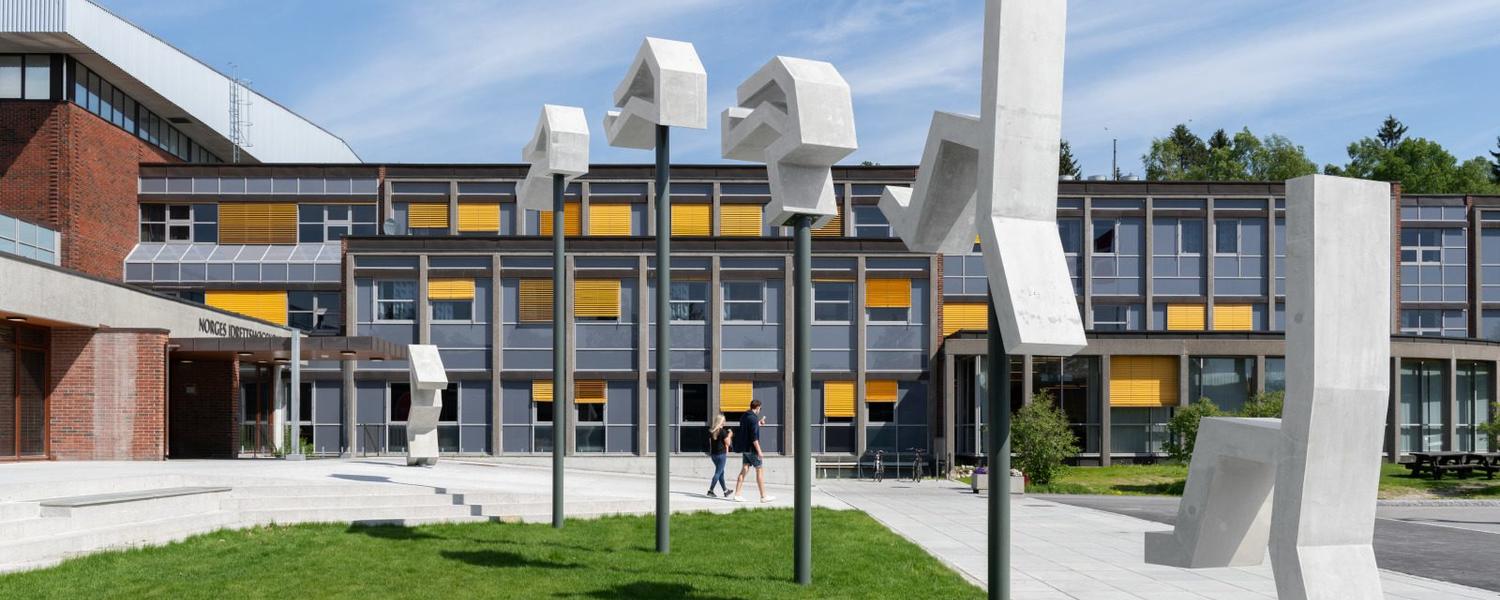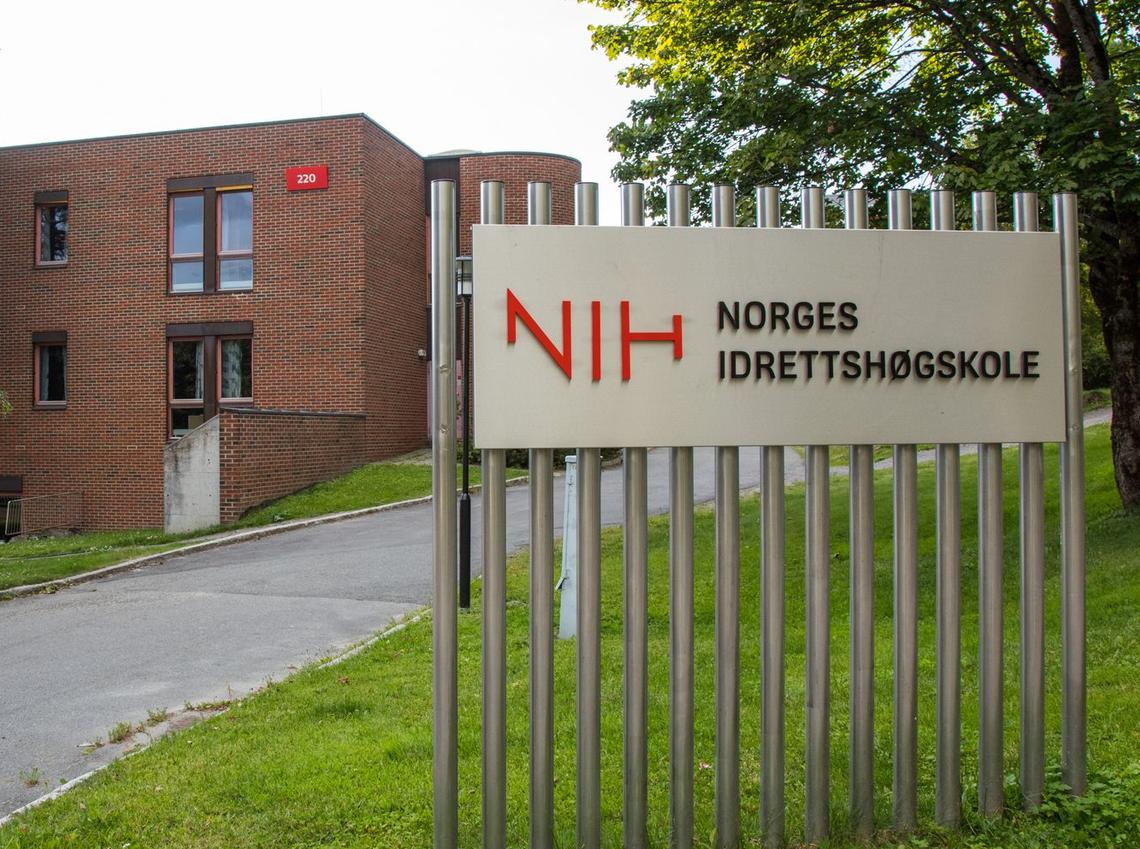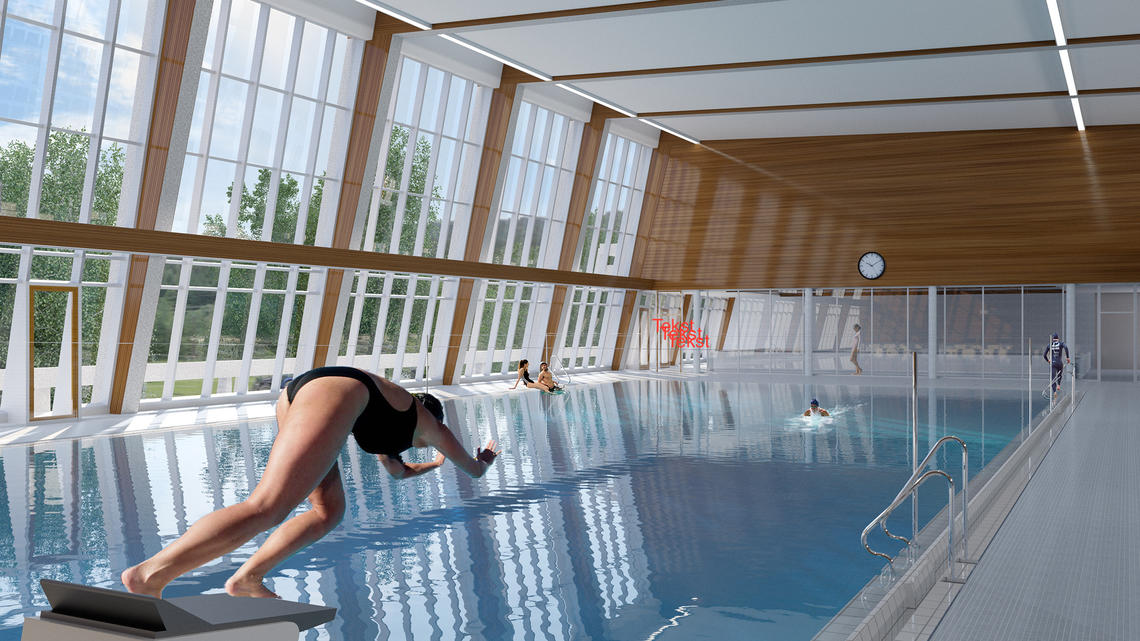
Norwegian School of Sport Sciences - Kines Only
Located in Oslo, this university campus is the perfect place to experience Friluftsliv ("free air life") - living life close to nature, an integral part of Norwegian culture.
Established in 1870, the Norwegian School of Sport Sciences (called NIH or "Norges idrettshøgskole" in Norwegian) is a scientific university that specializes in research and education within the field of sport sciences. Located in Oslo, the capital city of Norway and Green Capital of Europe (2019), NIH is located just 25 min to the city centre by train, and metres from the wooded, serene Sognsvann Lake.
Spend your breaks swimming or skating on the lake, or take a half-hour between classes to jog around the lake's perimeter, and experience Friluftsliv ("free air life") - living life close to nature, an integral part of Norwegian culture.
Key information
Application information
Student experience


In-person Exchange program details
Areas of Study: NIH offers a variety of Kinesiology courses in English in several "course packages". Exchange students are required to choose 1 package and can only take courses from within that package. Course packages are divided by semester; most are offered in the fall. The packages currently available are:
- Autumn semester: Exercise, Health & Performance; Outdoor Studies; and Sport Management & Coaching
- Spring semester: Sport Management & Coaching
For more details about these course packages, consult NIH's website here.
There are other unique opportunities available at NIH. General information is listed below, however please contact the UCalgary exchange advisor to discuss your specific plans.
- Students who will be in their 4th year during the exchange may be eligible to take Masters courses on a case-by-case basis.
- There is an independent research course offered in both the fall and spring semester. This can be used to substitute one of the courses in the course package and pursue research during your exchange. (All course packages except Outdoor Studies are eligible.)
- An internship placement may be available for students doing a full-year exchange. Students must take the Sport Management & Coaching course package in the fall, followed by a spring internship.
Course requirements:
In Europe, a full-time course load is typically 30 ECTS (European credits). 6 ECTS = 3 UCalgary units (1 standard semester course). Exchange students in Norway are required to take 24-30 ECTS. It is possible to get 30 ECTS for the course packages offered at NIH, meaning you will receive credit for 5 courses.
The academic year is divided into 2 semesters:
- Autumn (fall) semester runs from mid-August to late December
- Spring (winter) semester runs from early January to mid-June.
Note: The Autumn semester is popular and sometimes receives more applications than space available. Students applying for a fall exchange at NIH are encouraged to apply for back-up exchange programs.
-
Costs
Exchange students pay their tuition and academic fees to the University of Calgary. Other expenses are paid directly to the service provider.
While Norway can be expensive, as a student it is a little more afjordable! Here is a rough cost estimate for a semester at NIH:
Student Housing 15,000-17,500 NOK
Food 12,000-15,000 NOK
Books & Supplies 5000 NOK
Transit 2500 NOK
Other expenses 12,000 NOK
Total semester cost 46,500-52,000 NOK (approx. $6000-7000 CAD)It's recommended that students budget a minimum of NOK 10,500 per month to pay for accommodation and living expenses. If you plan to register in the Outdoor Studies course package, you may need to budget more due to the amount of excursions - it is recommended to bring the relevant equipment from home where possible (contact exchange advisor for info on this). More financial information can be found online.
Oslo cost comparison vs. Calgary: Click Here
Student Tips: "Eating out and food/beverages overall were expensive, but exponentially cheaper from the grocery store, and rent is comparable to UCalgary. Also, only consider opening a Norwegian bank account if you will be there for a full year, as it takes considerable time (months) to set it up. I would recommend looking into the rates your bank will give you on foreign withdrawal/credit charges."
-
Funding
Did you know that you can take your UCalgary funding with you on exchange? Since you remain a degree seeking student at UCalgary while on exchange you remain eligible for any awards and scholarships you are eligible to receive from the university as well as student loans.
The UCalgary Faculty of Kinesiology has a study abroad award specifically for Kinesiology students attending exchanges at NIH! This is a faculty-nominated award worth $1000. Please click here for more information.
In addition, our office administers several awards, including the Global Access Fund (based on a funding-first model where students apply prior to committing to a global learning program) and the Global Learning Award (students apply after being accepted to a global learning program; the amount varies year-to-year as the money is split among chosen recipients). Students may only receive these awards once. Please see the funding page, linked below, for more information.
Student Tips: "Buy a student transit pass in the first week - you will need to use your student acceptance letter for this. To and from the airport, just add a zone onto your student pass. Your student pass also works for the islands on Oslo fjord. Visit the west coast early in the fall or summer if you plan to go: some of the most beautiful/famous hikes are only available in summer/early fall. The Grønland district has cheaper produce markets than anywhere else. Walk onto the roof of the Oslo Opera house, visit the Viking Ship Museum, and always have your student card - many activities/museums are cheaper for students!"
Housing at NIH is run in partnership with the Foundation for Student life in Oslo (SiO). Students accepted to this program by UCalgary must then submit an independent application to SiO's housing application. It is recommended that students stay in student housing due to cost and location.
SiO has many student housing units in Oslo and the surrounding areas, but it is strongly recommended to apply for Kringsjå, Fjellbirkeland or Sogn Student Villages (in that order), as they are the closest to NIH. In fact, Kringsjå student village is located only 100 meters from campus. Housing contracts for exchange students are normally issued for the entire semester, and students will need to provide their own duvets, pillows, kitchen utensils, and possibly lamps. For more info on housing, refer to the NIH page on housing.
SiO also offers a good selection of adapted homes for various types of disabilities. Once you are nominated, please speak with the exchange advisor on any needs so that they are submitted in your application to NIH to allow sufficient time to arrange this for you.
This exchange is open to regular, full-time undergraduate or graduate students in the Faculty of Kinesiology at UCalgary, who have completed at least 24 units (8 courses) at the post-secondary level at the time of application, with a minimum cumulative GPA of 2.7 (B-).
Please note: a minimum 3.0 GPA is required to be considered for the Kinesiology study abroad award, mentioned in the Costs & Funding section above.
No knowledge of Norwegian is required, as all courses offered on this program are taught in English.
Do I have to speak Norwegian?
No prior knowledge of Norwegian is required for this exchange. NIH offers a selection of Kines courses in English.
How can I learn or improve my Norwegian?
Har du lyst til å lære norsk? NIH offers 20 hours of Norwegian language instruction for beginner learners, free of charge for exchange students. The course is coordinated with other courses for exchange students so it does not overlap with regular classes. Students who attend 80%+ of the course will be given a participation diploma (however no credits are awarded). You will be able to sign up with your application to NIH, if nominated to this exchange by UCalgary International.
What's special about Oslo?
Surrounded by dense forest and opening onto the expansive, island-spotted Oslofjord, it's easy to imagine how Norway's capital city has evolved in its 1000+ years of settlement. Here, it's easy to take a brief escape from the urban hum and delve into the natural surroundings. Catch a ferry to explore the fjord's multitude of small islands, travel out of the city to try your hand at climbing and bouldering, or round the corner and spot a waterfall while walking down riverside streets. In Oslo, ski jumping ('ski' is Norwegian for "piece of wood") is a popular sport, with competitions held at Holmenkollen, the world's most modern jump. For more information on life in Norway, please visit the Study In Norway site for their information on "Living in Norway"
What resources are available for new students?
NIH organizes a Buddy Week for new incoming students at the start of the semester, which includes things like BBQs, hikes, campus tours, social quiz/bingo, pizza nights, etc.
GiGass is a club at NIH for anyone interested in participating in affordable social trips to ski the Alps, go on a ski/snowboard trip to nearby Hemsedal, surf trips, climbing trips, longboarding, figure skating, cake fighting, slakkline, and more. No experience required, and membership is only 60 Krones!
NIH also has good fitness facilities for students, including a swimming pool and rental equipment. Next door is Toppidrettssenteret, the elite training centre operated by the Norwegian Olympic Committee for Norway's top athletes, which gives students the opportunity to learn and interact with top athletes, trainers, and coaches - students can get access here for a fee (est. $70/month).
What supports or services are available at NIH?
NIH's UPT team offers support to students with any physical and mental accessibility needs or support, and for individual learning or exam needs. Students who require exam arrangements should notify the exchange advisor early in the application process in order to meet NIH's deadlines on special arrangements. NIH is affiliated with SiO, which arranges housing - they offer a good selection of adapted homes for various types of disabilities. Advanced training facilities for paralympic athletes is also available.
For information on accessibility and support services at campuses across Europe, please check out Inclusive Mobility. For city-specific services and places in Europe, the Jaccede interactive platform (website and/or smartphone app - both Android and iOS) also provides a searchable user-built database to identify important accessibility information of public places and locations.
Online Exchange program details
If you are unable to travel to Norway or can't fit a full semester exchange into your degree, you can still access unique sport science courses through this online exchange option!
The Fall (Autumn) semester runs from August to December and the Winter (Spring) semester runs from January to June. Students can do the online exchange for one or both semesters, take one or more courses per semester, and combine the online exchange courses with regular UCalgary courses if desired. The courses are module-based, so you can study at your own pace, with final assignments/exams due online at the end of the semester. The courses are largely asynchronous but there are opportunities to interact online with your classmates/instructors.
All of the courses have been pre-assessed by the UCalgary Kinesiology faculty either as KNES 9XX (senior credit) or KNES 3XX (junior credit).
- SPM 104: Sport and Sustainability - 10 ECTS (Winter only; KNES 9XX)
- SPM 120: Performance-enhancement and anti-doping in sport - 5 ECTS (Fall only; KNES 9XX)
- SPM 121: Sustaining sport for development and peace programs - 10 ECTS (Fall or Winter; KNES 9XX)
- SPM 123: International Organization of Sport - 10 ECTS (Fall or Winter; KNES 9XX)
- THP 111: The Female Athlete: Health and Performance - 10 ECTS (Fall or Winter; KNES 9XX)
- LKI 152: Introduction to the Movement Sciences - 10 ECTS (Fall or Winter; KNES 3XX; this course can be used towards the BKin science requirement)
Note that 6 ECTS = 3 UCalgary units (1 standard semester course). This means that 10 ECTS = 1 course at UCalgary, 15 ECTS = 2 courses, 20 ECTS = 3 courses, etc.
If you have any questions about credit or how these courses will fulfill your degree requirements, please contact the Kinesiology Academic Advising Office.
You will be charged tuition at UCalgary at your normal tuition rate. Tuition is assessed according to the number of NIH courses you attend (e.g. if taking 2 10-ECTS courses at NIH, you will be charged tuition for 2 courses, even though 20 ECTS transfers back to UCalgary as credit for 3 courses).
There are no other costs to participate! All course materials are provided online.
Although online programs are not eligible for Study Abroad specific funding, any regular university funding that you're eligible for can be used towards your online program (awards/scholarships, student loans, etc). We recommend browsing the UCalgary awards database.
This program is open to Kinesiology undergraduate students. Minimum cumulative GPA 2.7.
How to apply:
Click here to access the online application!
- After you log in, use the Study Programs tab to search for the application. You can just search by program name: Norwegian School of Sport Sciences - there is no need to add any other search filters. Make sure to select the Online Exchange application.
- The "Statement of Purpose" section of the online application is where you write a short statement of why you are applying.
- In the "Course List" section, list your desired course(s).
- The application will prompt you to read the Norway consular affairs report and enter the report date. You do not need to do this - to skip this question, just enter a random date in the text field.
- No reference letter or other documents are required.
Unlimited students are allowed to participate in the NIH online courses. This means everyone who is eligible can be accepted to the online exchange!
Once your application has been accepted, you will be nominated to NIH. You will then receive instructions to fill out a secondary application form and sign up for your desired course(s).
Do I have to speak Norwegian?
All of the online courses are taught in English.
For students with good knowledge of Scandinavian languages (Norwegian, Swedish, Danish, etc.) there are several online courses taught in Norwegian which you may be able to take. Note these courses have not been pre-assessed by the UCalgary Kinesiology faculty; you may be responsible for sourcing translated course outlines for the course assessment.
Can I take UCalgary courses in the same semester?
Yes, it is allowed to take regular UCalgary courses alongside your NIH online courses! Closer to the start of your semester, your exchange advisor will contact you to check how many courses you plan to take from NIH and from UCalgary, and they will ensure your tuition is set up correctly. If you wish to overload your semester (taking more than 5 courses in a semester) you will need permission from the Kinesiology faculty; speak to the Kines academic advising office, or contact the exchange advisor at study.abroad@ucalgary.ca for guidance.
Have questions?
The exchange advisor for this program is: Kathryn Bauer
How to Apply
Download the application guide
This PDF contains information on how to complete your application and what to do after you have applied.
Identify three programs of interest
We recommend applying for your top three programs for the priority application deadline, as placement may be competitive. We will assess your applications in ranked order.
Check requirements and deadlines
These may vary by program, so check the individual program pages and make sure that you are aware of any different application deadlines or eligibility requirements.
Start your application
Once you have gathered everything you need, you can begin your application!
Please note: Applications will not be considered complete until all required documents are submitted in full.
International travel presents challenges that may not be found when attending classes on campus. There may be a lack of resources, emergency services, hospitals, accessibility issues and/or demands on the physical and the mental self, all of which can challenge individuals when away from their usual support systems and structures. Adequate preparation is essential.
For this reason, it is imperative that you evaluate all aspects of your own physical, psychological, emotional and spiritual condition against the rigors of the particular global learning program you are selecting. If you are unsure of whether or not this program is a good fit for you and/or if you have any circumstances that could impede your enjoyment of the program, please contact us. Our Global Learning Advisors will be happy to assist in finding the best options for you and arrange any supports or accommodations necessary to ensure your success.
If you have or are seeking a certificate from Student Accessibility Services, you should provide this early to your Global Learning Advisor to ensure that the option that you are seeking can support your needs.
Please note: All participants must adhere to COVID-19 and other vaccination-related requirements for the destinations visited on this program. Failure to do so may have consequences such as being denied access to accommodation/housing, program activities, or to the host country itself.
